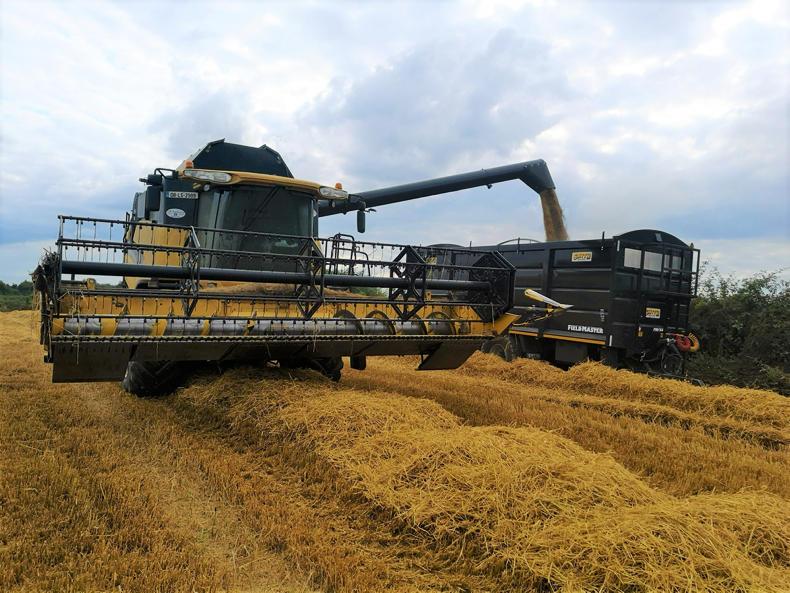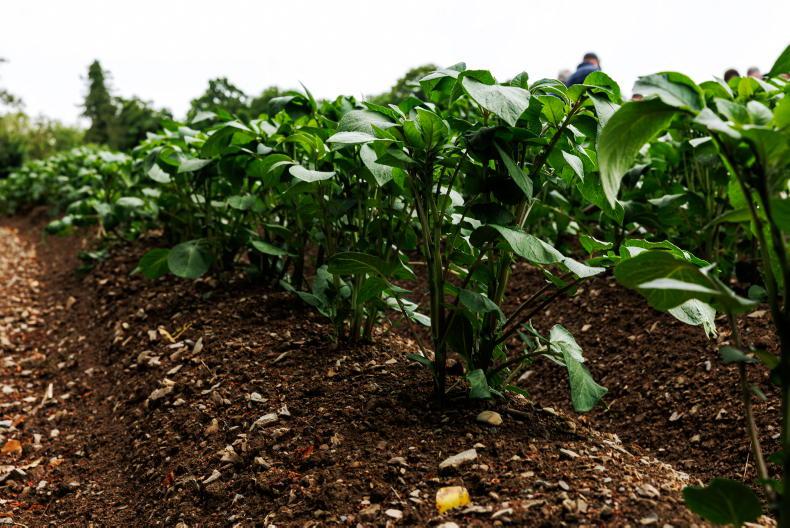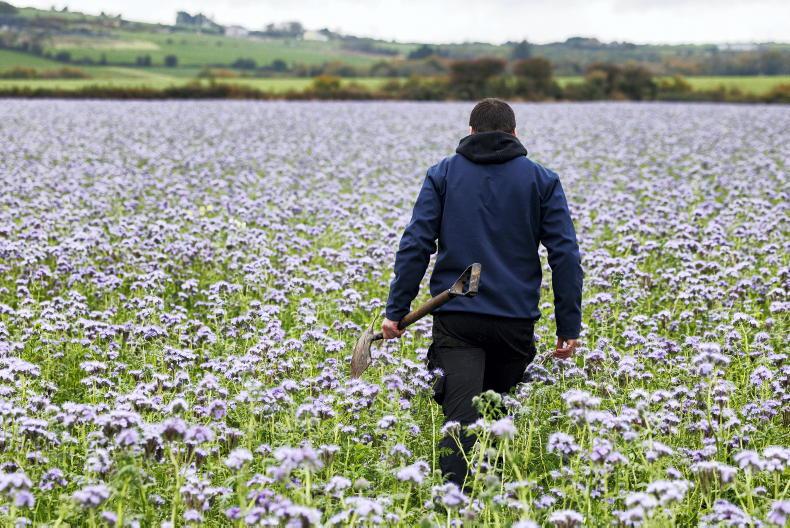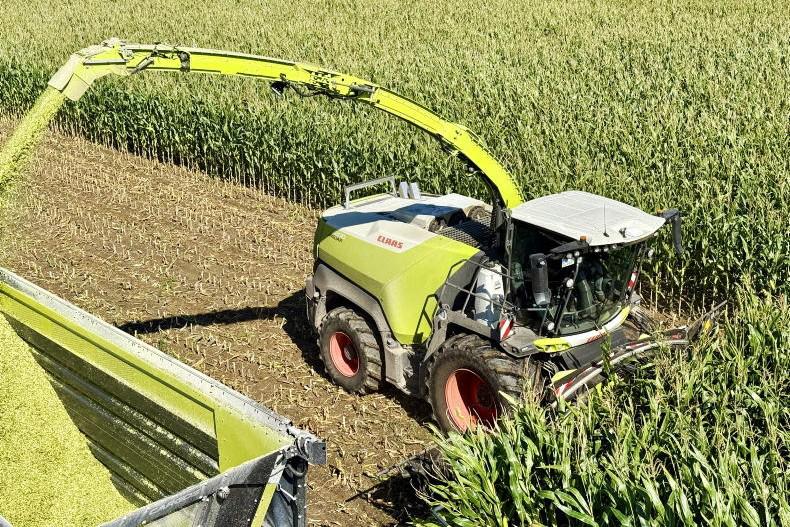With continued harvest delay and the further ripening of crops, growers will be faced with a harvest backlog once the weather settles.
Rainfall since 18 July 2019
Galway: 105.9 mm Laois: 79mm Wexford: 83.6mmPowered by Sencrop

The weather has taken its toll on Chris's spring barley crops.
Eyrecourt,
Co Galway
The winter barley harvest in Galway was broken, but the crop was harvested in relatively good condition explains Chris.
However, with around 111 mm of rain having fallen since speaking to him last, the wet has taken its toll on spring crops.
His winter barley harvest started on July 18 and finished seven days later. Yield patterns mirrored the rest of the country and proved to be very variable, ranging from 2t/ac - 4.2t/ac.
The crop averaged around 3.5t/ac. He had small amounts of BYDV present in a lot of his winter barley crops but he noted that fields with higher fertility levels did much better this year.
Harvest moistures were between 16%-21% and he is drying the grain down to 13% at the moment.
All of his straw is baled and required minimal turning. He averaged around 11 4x4 sqaure bales/ac.
Demand from his regular customers is normal, but the market is somewhat quiet in the west
Chris intends on sowing fodder rape in all of his winter barley ground this year. The stubble will be disced twice, sown with a Kockerling 6m air seeder and rolled after.
The crop will be grazed throughout winter by sheep and will be sown with fodder beet next year.
His first and second winter wheat crops are still standing well and some fields have been burnt off.
While crop condition is good, there are reports of sprouting in the area.
He aims to harvest and dry his ripest crops this week. The grain moisture content is currently 30%.
Many of his spring barley crops have suffered some degree of lodging in the last month, with his more advanced crops now flat.
Chris will burn the crop off when a settled spell of weather arrives. The grain quality is still good for now.
He hopes to start whole cropping spring wheat this week, but thinks some will be carried through to harvest.
His sugar and fodder beet crops are progressing very well and last week received Escolata (0.3l/ha) along with Boron (3l/ha) and Manganese (1.2l/ha).

Paul finishing the last of his winter barley harvest a number of weeks ago.
Ballybrittas,
Co Laois
Paul completed his winter barley harvest with just one day’s interruption from the rain.
However, rainfall levels are back to normal and around 82mm fell since speaking to him last.
Ground conditions remain good but if much more rain falls, conditions will soon become sticky, Paul explains.
His winter barley harvest commenced on July 6th and was completed by the end of the month.
Crops were slow to ripen, creating hopes of a high yielding year but yields proved to be variable, ranging from 2.8t/ac to 4.1t/ac with the farm average coming in at 3.4t/ac.
This is 0.4t/ac lower than last year and well short of the farm average of 4t/ac.
BYDV, take-all and a prolonged dry spell earlier in the year may have had a hand in this.
Specific weights ranged from 63-65 KPH and moistures started at around 20% but then decreased to 16% as the harvest progressed.
Paul explained that straw was green to begin with and required a few days to dry out.
However as straw moisture decreased, he was able tighten the gap between combine and baler. As a result, little straw was turned.
Yields averaged around seven 8x4x3 square bales/ac. All baled fields have been cleared and have been cultivated with 6m Lemken heliodor discs.
Paul has around 25ac of winter barley left to bale which will require turning with his single rotor rake.
Demand from local and northern straw buyers has been steady, but he notes that movement from his western buyers has been quieter than usual.
Demand for his winter wheat straw, which usually goes for feeding, is higher than normal.
His winter wheat crops will be ripe by the end of this week and he has high hopes for their potential.
All crops are standing despite the heavy rain. However if wet weather persists, the risk of sprouting will increase.

Vivion's later planted potato crops are also developing well with excellent skin finish so far.
New Ross,
Co Wexford
There is never a good time for the combine to break down - especially during the harvest.
Given the lack of cutting opportunities over the weekend, Vivion had plenty of time to replace the belt on his Claas Lexion 430, which snapped last Thursday evening.
His winter barley harvest hasn’t been entirely smooth, with several broken days.
His Craft winter malting barley was first to be harvested, averaging 3.5t/ac, 66KPH, 8.6% protein and moisture content at 18%. Some of the crop was badly affected by BYDV.
Both his two row and six row hybrid feed winter barley crops performed better, having averaged 4.43t/ac between them. His Belfry hybrid barley averaged 5t/ac. “It was all in the grain weights, it’s a good sign when you need the extra trailer” Vivion remarks. The crop averaged 67KPH at between 15%-20% moisture content.
Straw took a number of days to dry and proved tricky to bale between the showers, but averaged around seven 8x4x3 square bales/ac.
Vivion’s winter oats were planted in ground with low fertility to help clean the field up.
The crop yielded between 2.7t to 3.2t/ac. He decided to chop the oat straw to help improve soil health.
He planted a five species cover crop mix consisting of phacelia, vetch, tillage radish, clover and linseed into winter barley stubble.
The crops were sown by a contractor and rolled after for around €37/ac plus VAT (including seed).
Vivion also started his early spring malting barley last week. His Laurette crop suffered little setback this year and has so far averaged around 4t/ac at 19.5% moisture content.
Proteins came in at 8.6% while screenings came in at 2.5%. He fears that straw breakdown and fusarium could be an issue if the weather doesn’t settle. His winter wheat is also ready for harvesting.
His potato crops have bulked well and he expects to desiccate them early. They received a blight spray of Infinito (1.6l/ha) and Ranman (0.5l/ha) last weekend.
Read more
Boortmalt not reducing barley buying after plant collapse
Watch: racing the rain in Co Down to harvest DK Exclaim oilseed rape
Tillage Management: harvest progress is intermittent
With continued harvest delay and the further ripening of crops, growers will be faced with a harvest backlog once the weather settles.
Rainfall since 18 July 2019
Galway: 105.9 mm Laois: 79mm Wexford: 83.6mmPowered by Sencrop

The weather has taken its toll on Chris's spring barley crops.
Eyrecourt,
Co Galway
The winter barley harvest in Galway was broken, but the crop was harvested in relatively good condition explains Chris.
However, with around 111 mm of rain having fallen since speaking to him last, the wet has taken its toll on spring crops.
His winter barley harvest started on July 18 and finished seven days later. Yield patterns mirrored the rest of the country and proved to be very variable, ranging from 2t/ac - 4.2t/ac.
The crop averaged around 3.5t/ac. He had small amounts of BYDV present in a lot of his winter barley crops but he noted that fields with higher fertility levels did much better this year.
Harvest moistures were between 16%-21% and he is drying the grain down to 13% at the moment.
All of his straw is baled and required minimal turning. He averaged around 11 4x4 sqaure bales/ac.
Demand from his regular customers is normal, but the market is somewhat quiet in the west
Chris intends on sowing fodder rape in all of his winter barley ground this year. The stubble will be disced twice, sown with a Kockerling 6m air seeder and rolled after.
The crop will be grazed throughout winter by sheep and will be sown with fodder beet next year.
His first and second winter wheat crops are still standing well and some fields have been burnt off.
While crop condition is good, there are reports of sprouting in the area.
He aims to harvest and dry his ripest crops this week. The grain moisture content is currently 30%.
Many of his spring barley crops have suffered some degree of lodging in the last month, with his more advanced crops now flat.
Chris will burn the crop off when a settled spell of weather arrives. The grain quality is still good for now.
He hopes to start whole cropping spring wheat this week, but thinks some will be carried through to harvest.
His sugar and fodder beet crops are progressing very well and last week received Escolata (0.3l/ha) along with Boron (3l/ha) and Manganese (1.2l/ha).

Paul finishing the last of his winter barley harvest a number of weeks ago.
Ballybrittas,
Co Laois
Paul completed his winter barley harvest with just one day’s interruption from the rain.
However, rainfall levels are back to normal and around 82mm fell since speaking to him last.
Ground conditions remain good but if much more rain falls, conditions will soon become sticky, Paul explains.
His winter barley harvest commenced on July 6th and was completed by the end of the month.
Crops were slow to ripen, creating hopes of a high yielding year but yields proved to be variable, ranging from 2.8t/ac to 4.1t/ac with the farm average coming in at 3.4t/ac.
This is 0.4t/ac lower than last year and well short of the farm average of 4t/ac.
BYDV, take-all and a prolonged dry spell earlier in the year may have had a hand in this.
Specific weights ranged from 63-65 KPH and moistures started at around 20% but then decreased to 16% as the harvest progressed.
Paul explained that straw was green to begin with and required a few days to dry out.
However as straw moisture decreased, he was able tighten the gap between combine and baler. As a result, little straw was turned.
Yields averaged around seven 8x4x3 square bales/ac. All baled fields have been cleared and have been cultivated with 6m Lemken heliodor discs.
Paul has around 25ac of winter barley left to bale which will require turning with his single rotor rake.
Demand from local and northern straw buyers has been steady, but he notes that movement from his western buyers has been quieter than usual.
Demand for his winter wheat straw, which usually goes for feeding, is higher than normal.
His winter wheat crops will be ripe by the end of this week and he has high hopes for their potential.
All crops are standing despite the heavy rain. However if wet weather persists, the risk of sprouting will increase.

Vivion's later planted potato crops are also developing well with excellent skin finish so far.
New Ross,
Co Wexford
There is never a good time for the combine to break down - especially during the harvest.
Given the lack of cutting opportunities over the weekend, Vivion had plenty of time to replace the belt on his Claas Lexion 430, which snapped last Thursday evening.
His winter barley harvest hasn’t been entirely smooth, with several broken days.
His Craft winter malting barley was first to be harvested, averaging 3.5t/ac, 66KPH, 8.6% protein and moisture content at 18%. Some of the crop was badly affected by BYDV.
Both his two row and six row hybrid feed winter barley crops performed better, having averaged 4.43t/ac between them. His Belfry hybrid barley averaged 5t/ac. “It was all in the grain weights, it’s a good sign when you need the extra trailer” Vivion remarks. The crop averaged 67KPH at between 15%-20% moisture content.
Straw took a number of days to dry and proved tricky to bale between the showers, but averaged around seven 8x4x3 square bales/ac.
Vivion’s winter oats were planted in ground with low fertility to help clean the field up.
The crop yielded between 2.7t to 3.2t/ac. He decided to chop the oat straw to help improve soil health.
He planted a five species cover crop mix consisting of phacelia, vetch, tillage radish, clover and linseed into winter barley stubble.
The crops were sown by a contractor and rolled after for around €37/ac plus VAT (including seed).
Vivion also started his early spring malting barley last week. His Laurette crop suffered little setback this year and has so far averaged around 4t/ac at 19.5% moisture content.
Proteins came in at 8.6% while screenings came in at 2.5%. He fears that straw breakdown and fusarium could be an issue if the weather doesn’t settle. His winter wheat is also ready for harvesting.
His potato crops have bulked well and he expects to desiccate them early. They received a blight spray of Infinito (1.6l/ha) and Ranman (0.5l/ha) last weekend.
Read more
Boortmalt not reducing barley buying after plant collapse
Watch: racing the rain in Co Down to harvest DK Exclaim oilseed rape
Tillage Management: harvest progress is intermittent











SHARING OPTIONS